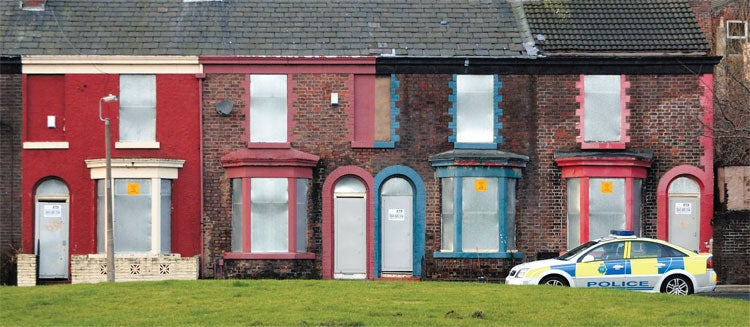North of England 'needs major derelict home refurbishment drive to kick-start stalled economic recovery'
Influential think tank says work should begin in struggling towns and cities including Burnley, Bradford, Hull and Blackpool with large concentrations of crumbling properties

Your support helps us to tell the story
From reproductive rights to climate change to Big Tech, The Independent is on the ground when the story is developing. Whether it's investigating the financials of Elon Musk's pro-Trump PAC or producing our latest documentary, 'The A Word', which shines a light on the American women fighting for reproductive rights, we know how important it is to parse out the facts from the messaging.
At such a critical moment in US history, we need reporters on the ground. Your donation allows us to keep sending journalists to speak to both sides of the story.
The Independent is trusted by Americans across the entire political spectrum. And unlike many other quality news outlets, we choose not to lock Americans out of our reporting and analysis with paywalls. We believe quality journalism should be available to everyone, paid for by those who can afford it.
Your support makes all the difference.A major drive to refurbish thousands of derelict homes across the North of England to help kick-start the stalled economic recovery is urged today by an influential think-tank.
Work should begin in struggling towns and cities including Burnley, Bradford, Hull and Blackpool with large concentrations of crumbling properties, many dating from the 19th century, it says.
The Centre for Cities also calls for a massive house-building programme in the ten areas worst hit by housing shortages, which are all in the South.
In its annual Cities Outlook it warns that decades of failed housing policy means Britain is building 100,000 fewer homes every year than is required to keep pace with demand.
But it says ministers should not simply focus attention on the overcrowded South-East, where people can need to earn more than double the average salary to get on the property ladder.
The Centre identifies ten population centres – nine in the North and one in Scotland – blighted by high numbers of empty homes in need of renovation or replacement.
The list is headed by the Lancashire town of Burnley, where more than seven per cent of properties are vacant.
It is followed by Bradford, Hull, Blackpool, Dundee, Leeds, Liverpool, Bolton, Blackburn and Birkenhead.
Councils in those areas should be given incentives to renovate houses or convert them into flats as “one of the most pressing needs is to consider whether the existing stock can be improved and vacancy rates reduced”, the Centre says.
Refurbishment programmes would also improve residents’ quality of life, help make the areas more attractive to businesses and generate jobs.
The Centre also lists ten cities in most need of house-building. Oxford – where the average house costs around £380,000 – is identified as the city with the nation’s least affordable properties, as defined by the cost of homes compared with local incomes.
It is followed by London, Cambridge, Brighton, Bournemouth, Aldershot, Crawley, Reading, Bristol and Worthing. All are areas where growing populations and sluggish housing development have combined to send prices soaring.
The centre says building an extra 100,000 homes a year could create 150,000 jobs – 90,000 in low-skill positions – and provide a one per cent boost to the economy. It says: “This is urgently needed at a time when the UK is still struggling to return to growth.”
Its chief executive, Alexandra Jones, said: “For some cities lack of housing prevents people accessing jobs or means they are stuck in cramped accommodation. In other cities, incentives to retrofit empty houses could improve local quality of life. Both approaches, adapted to local needs, would generate the jobs and growth the UK needs.”
The Centre also discloses that some cities entered recession early – and are recovering from it ahead of other areas. They include Sunderland, Hastings and Brighton who were hit hard by the downturn in 2008-09, but have seen economic growth since.
By contrast Nottingham, Preston and Liverpool fared better in 2008-09, but have since felt the impact of recession.
Join our commenting forum
Join thought-provoking conversations, follow other Independent readers and see their replies
Comments